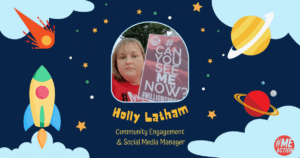Jack Croxall is an author, scriptwriter and blogger living in Nottinghamshire, UK. He fights ME both in life and in prose. Follow him on Twitter, on his blog, and view his books.
When you’re dealing with the symptoms of ME every minute of every day, it’s obviously difficult to forget that you’re sick. But I find it’s important to try and forget, at least for a little bit of time every day. This is where escapism comes in. Of course, the hobbies and activities that offer escapism are inherently draining for people with ME so it’s all about striking a balance between finding ways to enjoy yourself, and not overdoing it and bringing on a flood of symptoms. With the help of the #MEAction community, I’ve put together a list of activities that offer escapism to ME sufferers (different severities of the illness obviously dictate what is and isn’t possible), as well as a few community-sourced ways to try and undertake them without causing symptom flares.
How to Read with ME
Before I was ill, I considered reading to be one of the most low-energy activities there was. After all, you’re sitting in one place, inactive save from your eyes moving slowly down the page. But, oh, how ME has made me reassess that notion. Perhaps because your brain is constantly having to build and rejig a moving picture, reading can be exhausting. And that’s a real shame because nothing helps you forget your woes quite like disappearing into the pages of a good book.
So what are some coping strategies to help with reading when you have ME? Firstly, don’t overdo it. Typically, two chapters a day is about all I can manage myself, but your mileage may vary.
I also find reading in strong natural light is a lot less straining than reading via the yellow-ish glow of artificial light. What you use to read is also important, with eReaders providing a possible alternative to a big weighty tome.
Holly Latham suggests: “[Using a] Kindle Paperwhite works best for me. It’s lightweight, I can adjust the brightness levels and it’s much easier on my eyes than my mobile phone or tablet. I like that I can read without a light turned on if needed.”
Listening to Spoken Audio Content
If reading isn’t possible for you, you might like to try audiobooks. Via Twitter, @JourneyFog explained: “I love listening to audiobooks. Less taxing than reading text and it’s easy to break up the book into small, manageable chunks.”
Louise Hoek added: “I shut off from the world by putting my earphones in and listening to an audiobook”.
Louise went on to suggest: “For true escapism, Harry Potter, Terry Pratchett etc, nothing too mentally challenging. I would say I can tolerate between 30 and 60 minutes [before bringing on brain fog and other symptoms].”
Listening to podcasts is also a good option, and there really is a podcast for every conceivable topic. I listen to podcasts about films, my favourite TV shows, writing, gaming, and so much more. I spend a good portion of every day doing this, lying down in a dark room, recharging my batteries between exertions.
If you’re looking for podcasts about ME, I recommend, “It’s Not All About ME” and “The ME Show with Gary Burgess.”
It’s also surprisingly easy to start your very own podcast. I record a gaming podcast (Game Chats) literally ten feet away from my bed with nothing more than a microphone, laptop and co-host. Services such as Podbean and YouTube will host your content for free once you sign up to them, and you can record using free programs such as Audacity. Obviously, this is a much bigger exertion than simply listening to pre-made content, but it might be worth considering for some!
Watching Films/TV
Personally, I can last for a little longer watching TV than I can reading. I still find it exhausting though, so let’s consider some of the strategies the #MEAction community finds helpful when watching stuff. One thing that came up a lot (and I certainly practice this too) is not watching things all in one go. Movies can last for two hours and well beyond, and straining for that long risks bringing on symptoms. Instead, try breaking them up into chunks and resting between each section. I sometimes watch a movie in bitesize chunks over the course of three or four days!
Or, as @PhilM64 suggests, try watching: “Something you’ve seen before. So no need to focus too hard on the plot.”
Alternatively, @karen_renton has some good advice: “I always Google a film plot before I watch it as I rarely see the ending!”
Screen size is another concern. Big screens provide much more to take in, but a tiny screen (your phone for example) may force you to squint. Try watching stuff on a laptop and adjusting your player’s window to the size that suits you best. Additionally, special glasses exist that reduce glare from artificial screens, and these can be useful too.
Walking and the outdoors
Not everyone with ME can leave the house. But, if you can, a gentle walk can be good for body and spirit. I personally find nature to have a therapeutic effect so, if you can get out to a green space regularly, it’s well worth trying to do. Obviously, vitamin D and exercise offer physical benefits, but how much exercise you can handle depends on the severity of your ME.
When it comes to any outdoor excursion, I find making sure I wear light clothing, always wear sunglasses to combat light aversion, and planning a safe distance/route in advance aid tremendously.
Other nature-centric activities include birdwatching, something less physically demanding than walking.
@hopeforMEyet says: “I have bird feeders in my garden and love watching all the different birds feed.”
@jmatwood adds: “I also have bird feeders and water sources in my yard to attract birds, and watching them gives me a lot of joy. There’s something about watching them that feels like a hug for your heart. It’s hard not to love the birds and squirrels. Even the raccoons!”
@jmatwood also suggested: “The most important thing I’ve been able to do for my quality of life has been growing plants from seed. It’s extremely life affirming and, depending on the plant, something that’s accommodating.”
Playing video games
I enjoy gaming because it provides you with entire worlds to explore without having to physically move. It is possibly the most draining of stationary activities though, as games by their very nature conjure up scenarios for you to solve and demand that you exert brain power to do it. I still find gaming hugely beneficial however, and I would suggest taking the time to seek out short, relaxing games on the platform that best suits you.
@OmCatz advises: “I play games on tablet or PC in short bursts. Can’t respond to game controllers as too many buttons.”
Now let’s talk about specific ME-friendly games. Paddy (host of the “It’s Not All About ME” podcast) recommends: “The gentle approach to collecting in Pokémon “Let’s Go” on Nintendo Switch. On PlayStation, “No Man’s Sky” for some chilled-out planet hopping.”
I also asked Daily Star video game journalists Rebecca Stow and Rebecca Nicol for their ME-friendly game suggestions. Rebecca Stow: “Anything from the Animal Crossing franchise by Nintendo. These relaxing games are bright and colourful, and you play at your own pace.” Rebecca Nicol: “Farming simulator Stardew Valley [available on all gaming platforms] is my go-to chill time game!”
Creative outlets
A lot of community members suggested doing something creative as a form of escapism.
@Jude_ME said: “I do etching/drypoint printing in short bursts over time. I’ve also taken up knitting, and do 20 mins each day. Both activities I do lying down.” But how do you undertake a new, specialist hobby when you’re sick with ME?
@Jude_ME has the answer to that too: “I taught myself using YouTube videos last year.” Internet tutorials are certainly a great resource, with many being free to watch.
Personally, I love to write fiction. The actual sitting up and typing part can be draining, but the process as a whole offers huge benefits.
@TinyWriterLaura puts it perfectly: “I have little fantasy writing projects saved on my computer that I daydream about and scribble notes down for when I’m too sick to actually write. Being able to daydream about my characters is a great escapist tool for me.”
I couldn’t agree more, and this exact process led to my first novel and a whole universe of mental adventuring when I was bedbound!
If you have any advice for undertaking these or any other activities in ME-friendly ways, please share them! Easing the burden we all face with shared tips is a wonderful thing for the community to do!






1 thought on “ME Friendly Forms of Escapism, and How Best to Undertake Them”
Interesting list! Audio books for me are a no no as I find silence is far less taxing on my brain. But reading in short bursts is ok -although I only really read non fiction, so less imagination to try and use I suppose. My brain is usually more awake at night so I read for half an hour to switch off and sleep again.
I had to stop work 2 years ago so have loads of free time – but not always the energy to do anything with it!
I do find I can wake up in the morning a bit better by playing some gentle puzzle games on the ipad for half an hour in silence – I rarely have the sound on. Any noise in the morning is a no no.
On my better days I do photography – obviously my traveling range is limited but not all kinds of photography require traveling.
Watching TV can be relaxing if my brain up to it that day. Hobby activity really varies on how well I’m feeling that day though.
Comments are closed.